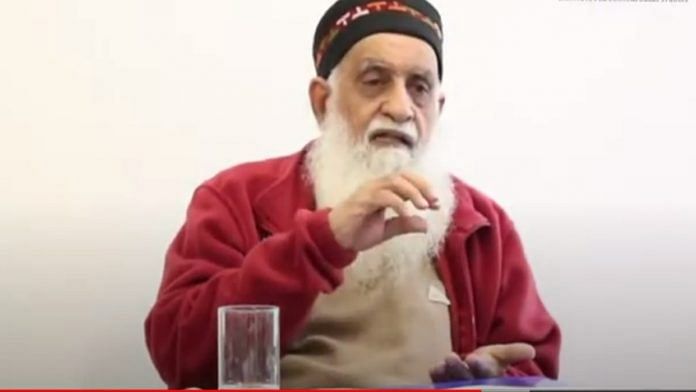New Delhi: Environmentalist Ravi Chopra has resigned as chairman of the Supreme Court-appointed High Powered Committee (HPC) overseeing the Narendra Modi government’s Char Dham highway project, stating that his belief that the panel could protect the fragile ecology of the Himalayas “has been shattered”.
Chopra’s resignation letter, dated 27 January, which has been accessed by ThePrint, was submitted to the secretary general of the Supreme Court. Chopra said he saw “engineers armed with modern technological weapons assaulting the Himalayas”.
“They have slashed through pristine forests, wounding vulnerable Himalayan slopes to widen highways. Ever-increasing numbers of tourists speed along them, their vehicles spewing noxious gases that cover the towering peaks ahead in an unsightly haze. The engineers exult and circulate photographs proving their conquest of Nature, little realising that they too are a part of Nature and cannot survive if their own natural environment is destroyed,” Chopra wrote in the letter.
He also stated that the HPC’s role had been confined, and its previous recommendations on the Char Dham project ignored. “In the circumstances, I do not see any purpose in continuing to head the HPC or indeed, even to be a part of it,” he added.
Also Read: Modi, Kedarnath, Ganga arti — what BJP’s campaign push in Uttarakhand says about its message
SC’s December 2021 order
The Rs 12,000-crore Char Dham highway project, spanning 900 kilometres, is an initiative of the Modi government to connect four Hindu shrines — Gangotri, Yamunotri, Kedarnath and Badrinath — in Uttarakhand.
Last December, the apex court had allowed double-lane widening of three strategic stretches of the project. In doing so, the bench, led by Justice D.Y. Chandrachud, had modified the top court’s September 2020 order that had restricted the road width on the entire highway — in the ecologically fragile Himalayan region — to 5.5 metres.
The order came after a December 2020 plea by the Ministry of Defence (MoD) to widen three stretches — the national highways from Rishikesh to Mana, Rishikesh to Gangotri, and Tanakpur to Pithoragarh. The ministry had said that the roads serve as feeder roads to the India-China border.
Some panel members, including Chopra, were of the opinion that maintaining the road width at 10 metres, as was sought by the government, will have a “long-term impact on the fragile Himalayan terrain and the sensitive Himalayan ecosystem”.
The SC bench, while permitting the road widening, also set up an oversight committee headed by retired SC judge Justice A.K. Sikri to ensure that the HPC’s observations on environmental concerns such as hill-cutting, muck disposal and preservation of water resources are addressed and its suggestions on remedial measures are implemented.
HPC’s role ‘confined’
In his letter, Chopra said the SC judgment had confined the role of the HPC to overseeing the implementation of its recommendations for the project on two “non-defence” roads. Moreover, since the panel’s previous recommendations on the project had been ignored, he said he felt that it was unlikely that the response of the Ministry of Road Transport and Highways (MoRTH) would be very different even in relation to the “non-defence” roads.
His letter said as a member of the HPC, he saw “the desecration” of the Himalayas.
“In September 2019, when asked to accept the assignment to chair the HPC, I deliberated whether my age would permit me to fulfil the strenuous responsibilities the assignment entailed,” Chopra recalled in the letter.
“I was compelled to accept by an inner voice born out of a 40-year commitment to help restore the degraded Himalayan environment and the livelihoods of its people. That same inner voice now compels me to move out. The belief that the HPC could protect this fragile ecology has been shattered,” he added.
(Edited by Gitanjali Das)
Also Read: What is Uttarakhand’s Char Dham board, and why angry priests want it abolished



